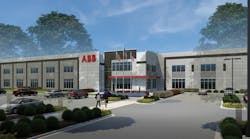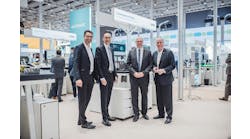ABB reported April 5 that it’s accelerating its growth strategy in the U.S. by investing approximately $170 million to create skilled jobs in manufacturing, innovation and distribution operations. The company adds it’s committed to growing in the U.S. by investing in its electrification and automation businesses that meet increased demand from industry-leading customers, while supporting the clean energy transition and the trend towards reshoring production.
For example, ABB also demonstrated its commitment April 5 by pouring the foundations for its new drives-and-services facility in New Berlin, Wis. It’s expected to increase U.S. production capacity of ABB’s industrial electric drives and provide added customer services. The company makes a wide range of AC variable frequency drives (VFD) and controls that reduce energy consumption. The nearly $100 million greenfield investment is expected to be completed in late 2024 and is replacing a neighboring facility that employs approximately 720 workers. Some 100 new jobs will be added over the next three years.
“The U.S. is critical to ABB’s success in a market that will continue to grow and benefit from our product portfolio, which enables the transition to a more energy-efficient future,” says Björn Rosengren, CEO of ABB. “Presently, 85% of ABB’s sales in the U.S. are from products produced locally, which provides customers with a more secure supply chain and keeps well-paying manufacturing jobs in America.”
ABB reports that recently passed legislation like the Inflation Reduction Act, CHIPS Act, and Infrastructure Investment and Jobs Act, gives it the confidence to invest in manufacturing capacity, distribution systems, and innovative products and services. The U.S. is ABB’s largest market, comprising 24% of its annual revenue.
Other projects underway across the U.S. include:
- Investing $3 million in the opening of an Installation Products Research & Development Lab and Innovation Center in Memphis, Tenn., to accelerate development of new products. ABB remains the seventh-largest private employer in Memphis.
- Opening packaging and logistics facility in Atlanta, Ga., for end-to-end robotic automation solutions in warehouse and distribution, retail and logistics. This $2 million investment will open in 2023 and create approximately 15 jobs.
- Previously announced $40 million investment in a new facility in Albuquerque, N.M., to manufacture Elastimold, the leading brand for underground cable accessories, which will support strengthening a more sustainable U.S. electrical grid. It underpins ABB’s commitment to improve reliability and resilience of the U.S. infrastructure, and assure greater safety for consumers, businesses, and communities. The investment will create 55 new jobs and will be completed by 2024.
- Previously announced expansion of North American robotics headquarters and manufacturing facility in Auburn Hills, Mich. As more customers turn to automation to build resilience, it will help improve efficiency and flexibility by enabling closer and reshoring production. The $20 million investment will create 72 jobs and be completed by the end of 2023.
- Previously announced opening of Installation Products Division Northeast Distribution Center in 2023. This more than $4 million investment in Lehigh Valley, Pa., will create more than 100 jobs and further regionalize ABB’s global supply chain to help reduce delivery times of high-demand electrification products to contractors by up to 50%.
- Previously announced opening of electric vehicle charger manufacturing facility in Columbia, S.C., to build up to 10,000 chargers per year, ranging from 20kW to 180kW in power, to support operators building a national charging infrastructure. ABB E-mobility’s investment will create more than 100 jobs.
“The Inflation Reduction Act is triggering investment in clean energy and supporting businesses that can produce technology locally,” explains Michael Gray, U.S. country holding officer at ABB. “More than ever, ABB is designing and producing products domestically to serve our U.S. customers as they move toward more sustainable electric power generation, clean energy manufacturing, electric transportation, and industrial efficiency including carbon capture and storage, as well as methane reduction.”





